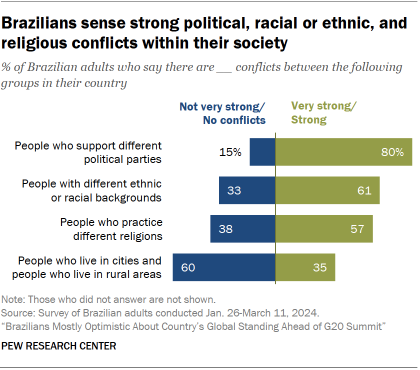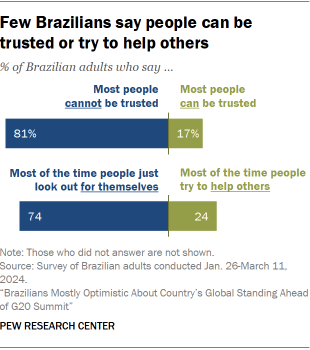Here are key takeaways about how Brazilians view societal conflicts in their country, and about their trust in other people:
- The vast majority of Brazilians (80%) see strong or very strong conflicts between people who support different political groups. Many also say there are strong conflicts among people with different ethnic or racial backgrounds and among people who practice different religions.
- About three-quarters of Brazilians or more say that most people cannot be trusted (81%) and that most of the time people just look out for themselves over others (74%).
Societal conflicts

A majority of Brazilian adults see strong conflicts between people who support different political parties, people with difference ethnic or racial backgrounds, and people who practice different religions. Eight-in-ten see partisan conflicts in Brazil, including 46% who say this type of conflict is very strong.
Fewer see conflicts between people who live in cities and people who live in rural areas: Just 35% say this type of conflict is strong.
When considering conflicts between Brazilians who practice different religions, views vary across age and ideological groups. Those ages 18 to 34 are more likely than those ages 50 and older to say there are strong religious conflicts in Brazil (70% vs. 45%). And those on the ideological left are more likely than those on the right to say the same (69% vs. 51%).
Age is also a factor in perceptions of racial and ethnic divisions: Younger Brazilian adults are more likely than their older counterparts to say these conflicts are strong. And Brazilians across racial groups are aligned on this question, with similar shares saying that there are strong conflicts between people of different ethnic or racial backgrounds in their country.
Interpersonal trust and altruism

Large majorities of Brazilians say that most people cannot be trusted (81%) and that most of the time people just look out for themselves (74%). Just 17% believe most people can be trusted, and 24% think people generally try to help others.
Men in Brazil are slightly more likely than women to say that most people can be trusted.
Those with more education are more likely than those with less to say people mostly just look out for themselves (77% vs. 69%).




